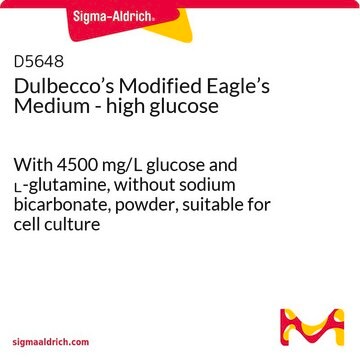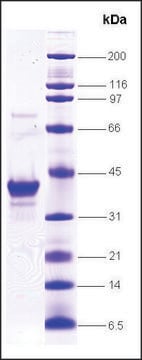ECAS9GFPPR
eSpCas9-GFP Protein
from Streptococcus pyogenes with mutations conferring enhanced specificity, fused with enhanced GFP, recombinant, expressed in E. coli, 3X NLS
Synonyme(s) :
eSpCas9-EGFP, eSpCas9-GFP
Se connecterpour consulter vos tarifs contractuels et ceux de votre entreprise/organisme
About This Item
Code UNSPSC :
12352202
Nomenclature NACRES :
NA.51
Produits recommandés
Produit recombinant
expressed in E. coli
Essai
≥90% (SDS-PAGE)
Forme
lyophilized powder
Conditionnement
pkg of 1 kit (3 components)
Gène reporter
GFP
Conditions d'expédition
wet ice
Température de stockage
−20°C
Description générale
Recombinant enhanced specificity Cas9-GFP protein from Streptococcus pyogenes (~192 KD) is a ready-to-use reagent for genome engineering experiments. When combined with target-specific guide RNAs, eSpCas9-GFP protein will act as a targeted nuclease suitable for transfection of cell cultures and for the accelerated development of genetically-modified animals via one-cell embryo injection.
An N-terminally fused enhanced green fluorescent protein with an excitation peak at 488 nm and emission peak at 509 nm allows for visualization of transfected RNP complex in addition to utility in flow cytometry applications. The protein also contains three varied nuclear localization sequences postioned for optimal activity.
An N-terminally fused enhanced green fluorescent protein with an excitation peak at 488 nm and emission peak at 509 nm allows for visualization of transfected RNP complex in addition to utility in flow cytometry applications. The protein also contains three varied nuclear localization sequences postioned for optimal activity.
Application
- Functional Genomics
- Target Validation
- Genome Editing
- Fluorescence Microscopy
- Flow Cytometry
Caractéristiques et avantages
- Enhanced specificity compared to wild type Cas9
- Highly active
- Ready-to-inject/transfect
Conditionnement
pkg of 50 μg ( ≥260 pmol )
pkg of 250 μg ( ≥1300 pmol)
pkg of 250 μg ( ≥1300 pmol)
Composants
Each kit consists of:
- one vial of lyophilized eSpCas9-GFP recombinant protein
- one vial containing 1 mL of 1x dilution buffer
- one vial containing 1 mL of nuclease-free water with glycerol
Principe
CRISPR/Cas systems are employed by bacteria and archaea as a defense against invading viruses and plasmids. Recently, the type II CRISPR/Cas system from the bacterium Streptococcus pyogenes has been engineered to function in eukaryotic systems using two molecular components: a single Cas9 protein and a non-coding guide RNA (gRNA). The Cas9 endonuclease can be programmed with a single gRNA, directing a DNA double-strand break (DSB) at a desired genomic location. Similar to DSBs induced by zinc finger nucleases (ZFNs), the cell then activates endogenous DNA repair processes, either non-homologous end joining (NHEJ) or homology-directed repair (HDR), to heal the targeted DSB.
Newly engineered eSpCas9 (1.1) enables the efficient targeted gene editing of established CRISPR systems with the benefit of reduced off-target effects. Point mutations (K848A/K1003A/R1060A) in the chromosome-binding motif of SpCas9, as described by Slaymaker, et al., provide higher on-target fidelity without loss of cleavage efficiency.
Newly engineered eSpCas9 (1.1) enables the efficient targeted gene editing of established CRISPR systems with the benefit of reduced off-target effects. Point mutations (K848A/K1003A/R1060A) in the chromosome-binding motif of SpCas9, as described by Slaymaker, et al., provide higher on-target fidelity without loss of cleavage efficiency.
Reconstitution
Lyophilized enhanced specificity S. pyogenes eSpCas9-GFP protein should be resuspended in the Reconstitution solution provided to desired concentration. Gently tap tube to completely dissolve lyophilized powder, incubate for 10 minutes on ice, and spin tube to bring material to bottom of tube.
Autres remarques
Use our CRISPR Selection Tool to order gRNA
Check out our other MISSION® Cas9 Proteins at SigmaAldrich.com/CRISPRproteins
Check out our other MISSION® Cas9 Proteins at SigmaAldrich.com/CRISPRproteins
Informations légales
MISSION is a registered trademark of Merck KGaA, Darmstadt, Germany
Code de la classe de stockage
11 - Combustible Solids
Faites votre choix parmi les versions les plus récentes :
Certificats d'analyse (COA)
Lot/Batch Number
Vous ne trouvez pas la bonne version ?
Si vous avez besoin d'une version particulière, vous pouvez rechercher un certificat spécifique par le numéro de lot.
Déjà en possession de ce produit ?
Retrouvez la documentation relative aux produits que vous avez récemment achetés dans la Bibliothèque de documents.
Les clients ont également consulté
Ian M Slaymaker et al.
Science (New York, N.Y.), 351(6268), 84-88 (2015-12-03)
The RNA-guided endonuclease Cas9 is a versatile genome-editing tool with a broad range of applications from therapeutics to functional annotation of genes. Cas9 creates double-strand breaks (DSBs) at targeted genomic loci complementary to a short RNA guide. However, Cas9 can
Kristina Seiler et al.
Cell death & disease, 13(5), 448-448 (2022-05-11)
The family of hexokinases (HKs) catalyzes the first step of glycolysis, the ATP-dependent phosphorylation of glucose to glucose-6-phosphate. While HK1 and HK2 are ubiquitously expressed, the less well-studied HK3 is primarily expressed in hematopoietic cells and tissues and is highly
Patryk Janus et al.
Cell death and differentiation, 27(7), 2280-2292 (2020-01-31)
Heat shock can induce either cytoprotective mechanisms or cell death. We found that in certain human and mouse cells, including spermatocytes, activated heat shock factor 1 (HSF1) binds to sequences located in the intron(s) of the PMAIP1 (NOXA) gene and
Natalia Vydra et al.
eLife, 10 (2021-11-17)
Heat shock factor 1 (HSF1), a key regulator of transcriptional responses to proteotoxic stress, was linked to estrogen (E2) signaling through estrogen receptor α (ERα). We found that an HSF1 deficiency may decrease ERα level, attenuate the mitogenic action of
Notre équipe de scientifiques dispose d'une expérience dans tous les secteurs de la recherche, notamment en sciences de la vie, science des matériaux, synthèse chimique, chromatographie, analyse et dans de nombreux autres domaines..
Contacter notre Service technique
















